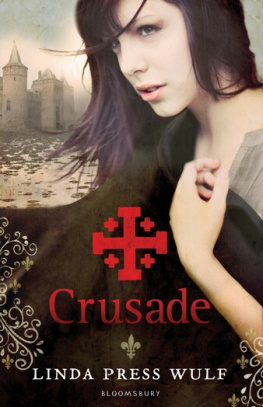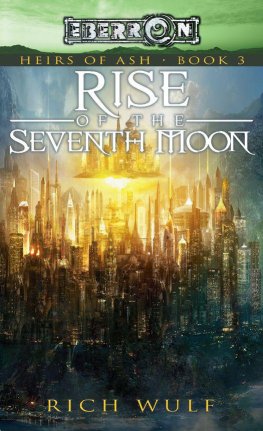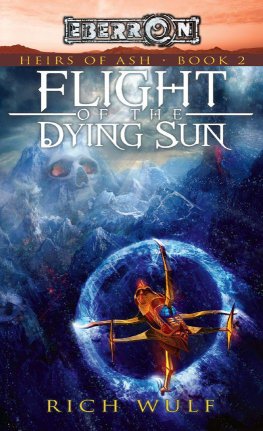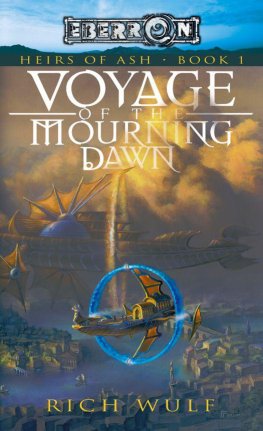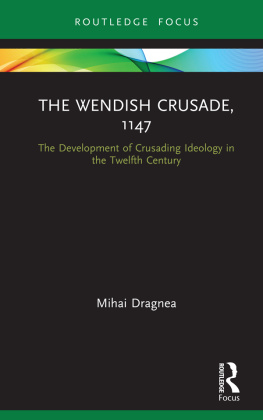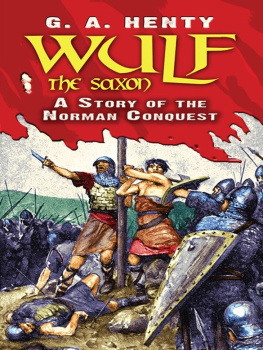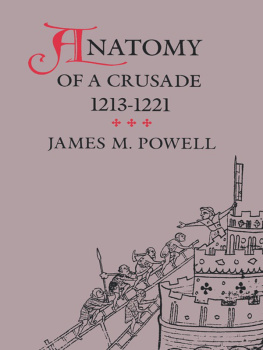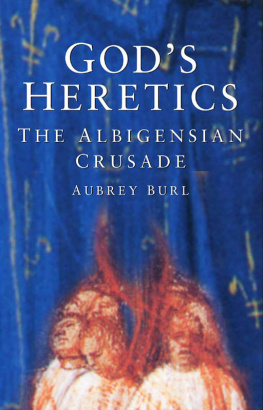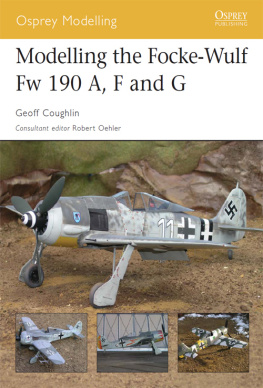Linda Press Wulf - Crusade
Here you can read online Linda Press Wulf - Crusade full text of the book (entire story) in english for free. Download pdf and epub, get meaning, cover and reviews about this ebook. year: 2011, publisher: Bloomsbury, genre: Art. Description of the work, (preface) as well as reviews are available. Best literature library LitArk.com created for fans of good reading and offers a wide selection of genres:
Romance novel
Science fiction
Adventure
Detective
Science
History
Home and family
Prose
Art
Politics
Computer
Non-fiction
Religion
Business
Children
Humor
Choose a favorite category and find really read worthwhile books. Enjoy immersion in the world of imagination, feel the emotions of the characters or learn something new for yourself, make an fascinating discovery.
- Book:Crusade
- Author:
- Publisher:Bloomsbury
- Genre:
- Year:2011
- Rating:3 / 5
- Favourites:Add to favourites
- Your mark:
- 60
- 1
- 2
- 3
- 4
- 5
Crusade: summary, description and annotation
We offer to read an annotation, description, summary or preface (depends on what the author of the book "Crusade" wrote himself). If you haven't found the necessary information about the book — write in the comments, we will try to find it.
Crusade — read online for free the complete book (whole text) full work
Below is the text of the book, divided by pages. System saving the place of the last page read, allows you to conveniently read the book "Crusade" online for free, without having to search again every time where you left off. Put a bookmark, and you can go to the page where you finished reading at any time.
Font size:
Interval:
Bookmark:
Linda Press Wulfs first book of historical fiction, The Night of the Burning , won awards and inclusion in annual lists of the best fiction for young adults. She grew up in South Africa, at a time when there was no TV to distract budding readers. She lives in Berkeley, California, with her husband and two sons, and is at work on her next novel.
This novel is based on historical accounts of two Childrens Crusades in the summer of 1212. One was inspired and led by a twelve-year-old German boy from the town of Cologne; the other led by a twelve-year-old French shepherd called Stephen. This book is about the French Childrens Crusade. With the permission of the King of France, Stephen marched thousands of youngsters, mostly between the ages of eleven and fifteen, along with a few monks and priests, all the way south to Marseilles, proclaiming that the sea would open for them and they would walk through the Mediterranean to claim the Holy Land.
The sea did not part for the pilgrims in Marseilles. Some remained in the south of France, while others attempted to return home. A large number accepted an offer of free passage to the Holy Land, sailing on seven ships operated by two men called William the Pig and Hugh the Iron. Many years later, a priest who had seen some of those children in Egypt arrived in Marseilles with the report that the ships were captured by pirates and the children, perhaps by prior arrangement, were sent as slaves to Alexandria, Damascus and Baghdad.
Some historians put the number of participants in the Childrens Crusades as high as 100,000, others as low as 5,000. No more is known than the few details above, so my story is necessarily fiction. A few historians believe that the Childrens Crusades never actually happened and that the story of an army of pure young souls was Church propaganda.
It is said that the famous tale of the Pied Piper was based on the Childrens Crusades, perhaps in an attempt to answer the haunting questions about why thousands chose to follow the two young leaders and why their families let them go. Better answers can be found in the religion-dominated atmosphere of that period in history.
In the thirteenth century, the western part of Europe was unified by a common Catholicism, headed by a powerful pope in Rome. The Church was teacher and unquestioned authority. Countryfolk, by far the majority of the population, were illiterate. Sons of wealthy fathers were taught by men of the Church, in Latin, but there were no schools for the poor. Peasants spoke only the local dialect and learned only the Bible stories the priests told them on Sundays, along with the tortures of Hell vividly described in church sermons. It is hard to imagine today, but there were no other sources of information or inspiration available.
The Church was also mother, father, doctor, nurse, and soup kitchen. Secular rulers of the time never considered providing their subjects with educational, medical and social welfare services. The Church was the only resource for poor and sick people, establishing hospitals run by priests or nuns and distributing food to many in dire need. Unwanted babies were left outside church doors, and travellers were welcome to stay in monasteries along the road. Work problems, marriage problems, depression and unfulfilled longings all were laid before God, or His earthly representative, the local priest.
The Crusades began as an effort by Christians from Europe to wrest control of the land of Jesus from the Muslims who had controlled that area for almost five hundred years. The first of these Crusades, in 1099, was successful and it inspired others, which continued in waves for nearly two centuries. After the First Crusade, the others were less successful and were marked by appalling cruelty towards unbelievers. The many thousands of victims included not only Muslims and Jews in the Holy Land, but also French and Bohemian Christians who differed slightly in belief from the Church. These included the Waldensians the Poor of Christ in this book who were labelled heretical and therefore persecuted. However, the Waldensian theme of a direct relationship with Christ, without ceremony or priestly intermediary, reemerged some centuries later in the doctrine of the new Protestant movement.
Anti-Semitism in Europe was rife at the time. Jews were restricted from almost every form of work except moneylending and trading, but those professions earned them resentment and envy, while the Church found it politically convenient to lay false blame on them for the death of Jesus. The Jews of France, England and Germany who had the misfortunate to live in defenceless, small groups along several routes taken by the Crusaders were seen as legitimate targets of brutality and looting.
In writing this book I have taken a few historical liberties. The University of Paris came to be headed by a single rector only ten to thirty years after the Childrens Crusade. The Fourth Lateran Council took place in 1215. And almost two decades passed before a priest arrived in France who told the story, for the first time, of what happened to the children on seven ships supposedly bound for the Holy Land.
Recommended Books on the Crusades and Europe of that Period:
Buehr, Walter. Crusaders . New York: G.P. Putnams Sons, 1959. Articulately written with imaginative descriptions.
Cosman, Madeleine Pelner. Medieval Wordbook . New York: Facts on File, Inc., 1996. A short and tart dictionary of words used by maids and masters, children and kings of the period.
Harpur, James. The Crusades. An Illustrated History . Thunders Mouth Press, New York, 2005. Clear and well written, with numerous illustrations taken from artwork on this theme through the ages.
Ladurie, Emmanuel Le Roy. Montaillou, The Promised Land of Error . New York: Vintage Books, 1979. A unique insight into the everyday life of peasants in a village in southern France (Occitania) from 1318 to 1325, compiled in minute detail for the purposes of the Inquisition against the heresies of Albigensianism by a zealous and meticulous bishop-prosecutor, Jacques Fournier, who later became Pope Benedict XII.
Langley, Andrew. Medieval Life. Eyewitness Books series. London: Dorling Kindersley, 1996. Superb illustrations in a volume of the superb Eyewitness series.
Toussaint-Samat, M. Stories of the Crusades . Myths and Legends series. New York: World Pub. Co., 1966. Well-told stories and fantastical myths that grew up around the Crusades and specific noble or ignoble Crusaders.
The Night of the Burning
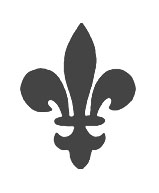
Foundling. Orphan. Parish child. All these names belonged to him but he didnt want to belong to them.
Robert le Corde , Robert the Rope , he was also called by the children in his neighbourhood, because of the knobbly scar, red and raised, that stretched like an unevenly coiled rope all the way from the outside of his eyebrow down to below his ear, at the jaw line. He had been trying to evade a crowd of such tormentors when he had scrambled up an ironwork gate and fallen, gouging the side of his head on the sharp iron points protruding from the top.
The barber-surgeon had shrugged his shoulders helplessly when he was called to tend to the unconscious little boy. The deep cut began too close to the eye for the barber to try sewing it together and all he could do was to give his most sagacious opinion: the boy would survive the injury if he didnt die.
Robert had been carried into the nearby church, the only church situated among the higgledy-piggledy huts in this poor neighbourhood on the outskirts of the city of Tours. The citys residents came here to dump their rubbish into the Loire. Children scavenged in the refuse on the riverbanks for anything that could be eaten or sold. Robert had slept on the floor of the church since he was a toddler, always at a little distance from the others who had no home.
Next pageFont size:
Interval:
Bookmark:
Similar books «Crusade»
Look at similar books to Crusade. We have selected literature similar in name and meaning in the hope of providing readers with more options to find new, interesting, not yet read works.
Discussion, reviews of the book Crusade and just readers' own opinions. Leave your comments, write what you think about the work, its meaning or the main characters. Specify what exactly you liked and what you didn't like, and why you think so.

